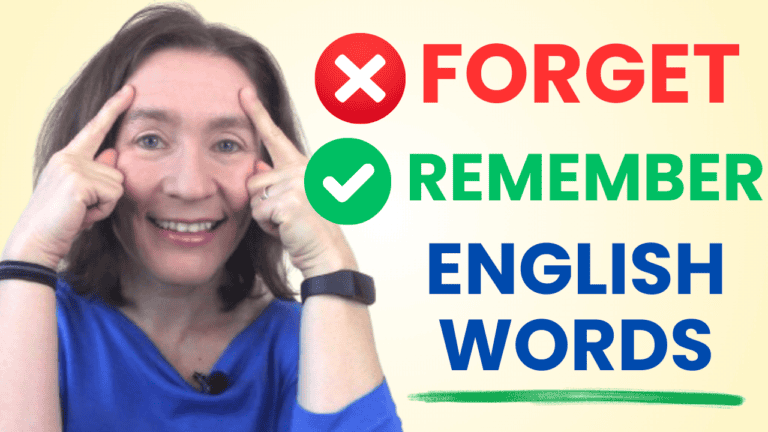
In today’s lesson, you’re going to learn some general vocabulary for talking about the Olympics, as well as specific vocabulary for summer and winter sports.
One tradition at the beginning of the Olympic Games is bringing the Olympic torch through the host city (the city where the games will be held) to light the flame at the arena.
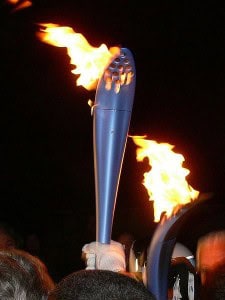
The general word for someone who does sports is athlete. Olympic athletes learn from and train with some of the best coaches/trainers in the world. Some Olympic sports are team sports – the word for the other people on your team is teammates.
Olympic athletes compete for the gold, silver, and bronze medals – and a person who wins is called a medalist. During the medal ceremony, each medalist stands on a podium and the national anthem (official national song) of the gold medalist’s country is played.
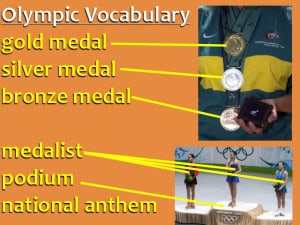
When a particular athlete or team is expected to win, they are called the “favorite” – and someone who is at a disadvantage, or who is not expected to win, is called the underdog. Sometimes the underdog manages to pull off a surprise victory! If an athlete performs an event better than anyone else in history, he sets a new world record.
The Olympics are a chance to demonstrate good sportsmanship – that’s a person’s behavior and attitude while participating in sports, especially fair play and courtesy. An example of “good sportsmanship” is an athlete who lost congratulating the winners. An example of “poor sportsmanship” is screaming and cursing after a defeat.
Unfortunately, some athletes resort to doping – using drugs to improve athletic performance – which is not allowed. If it’s discovered, the athlete is disqualified (declared to be removed from the competition). Olympic athletes should remember that they are role models (examples that many people, especially younger people, observe and imitate).
In addition to the Olympics, there are also the Paralympics for athletes with disabilities.
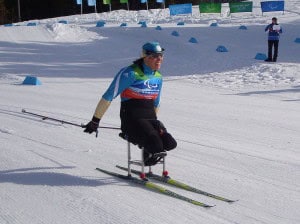
Let’s learn some vocabulary for specific sports in the summer and winter Olympics. For a full list, you can visit www.olympic.org/sports
Winter Olympics
Two sports that involve snow are skiing and snowboarding. There are actually three types of skiing – Alpine skiing, more commonly called “downhill skiing” is done on a slope (an incline), whereas Nordic skiing (commonly called “cross-country skiing”) is done on a flat surface. In freestyle skiing or ski jumping, the skier goes downhill to pick up speed, then goes off a ramp and flies through the air.
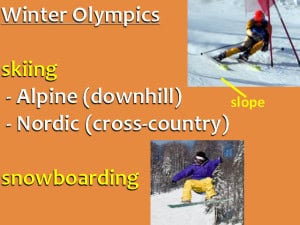
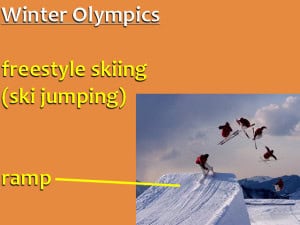
In bobsled, teams of two or four people race down an icy track in a sled – this is the general word for a vehicle that slides on snow or ice. Luge is similar – but it uses a different type of sled, with one or two people. And in the sport called skeleton, the athlete lies face-down on the sled and goes down the track head-first.
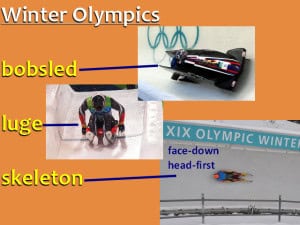
Three sports that are done on an ice rink are speed skating, figure skating, and ice hockey. Speed skating is a race – a competition where the fastest athlete wins. In figure skating, the skaters perform artistic jumps and spins. And in ice hockey, each team uses their sticks to get the puck into the goal.
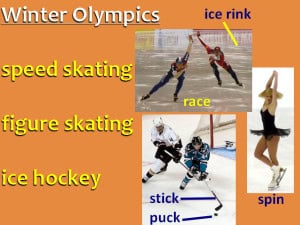
Summer Olympic Sports
Athletics or track and field is a general category that includes many different events – sprints (running short distances very fast), hurdles (jumping over barriers), relays (races in which the runners hand off a baton to a teammate to continue the race), as well as jumping and throwing events such as the pole vault, the discus throw, and more.
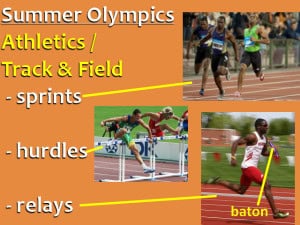
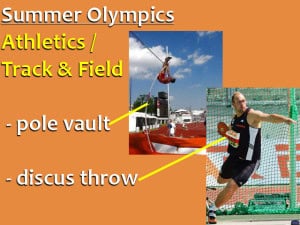
Gymnastics is another general category. It involves acrobatic events such as the balance beam, the uneven bars, the vault, and the rings. Gymnasts also do a floor routine in which they perform various flips (jumping and turning in the air).

Three sports done in the swimming pool are diving, water polo, and synchronized swimming – and there are many outdoor water sports, such as rowing and sailing.
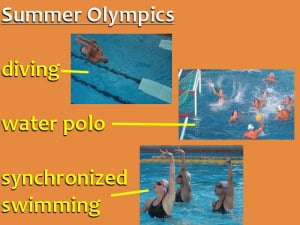
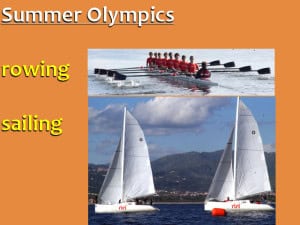
A few more interesting sports in the summer Olympics are archery – shooting at a target with a bow and arrow; equestrian, which is the art of horseback riding; and fencing, the sport of fighting with swords.
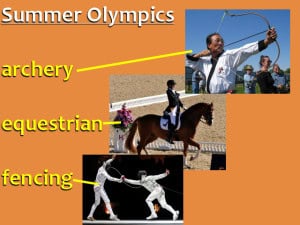
Want to increase your vocabulary
& improve your fluency?
Image sources:
- Michele Petino, Australian Paralympic Committee, David W. Carmichael, Clayoquot, Rickdrew, 极博双板滑雪俱乐部, Roberta F., Jon Wick, GWolbach, McSmit, K. “bird” N., Elliot, Erik van Leeuwen erki.nl, Eckhard Pecher (Arcimboldo), ms4denmark, Kpjas, Bundeswehr-Fotos, Dutch National Archives, The Hague, Fotocollectie Algemeen Nederlands Persbureau (ANeFo), 1945-1989, Bundesarchiv, Bild 183-G1026-0001-006 / Behrendt / CC-BY-SA, http://www.flickr.com/photos/14183788@N00/, Ichthyosis, Massimo Finizio, Jesus de Blas, Joebrunton, Apoincot, Darren Glanville from Acle, Norfolk, UK, Marie-Lan Nguyen








